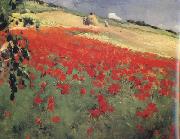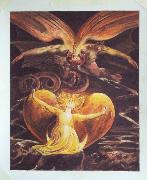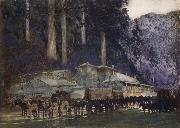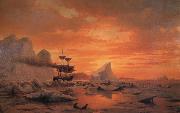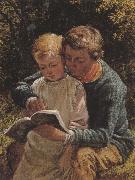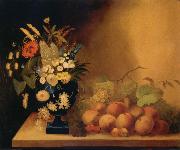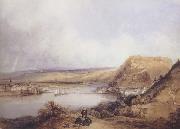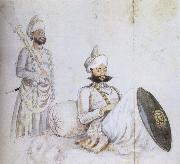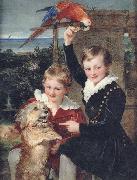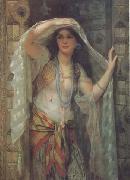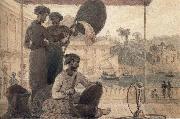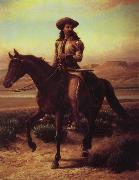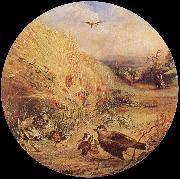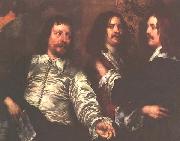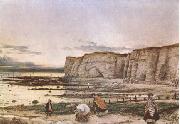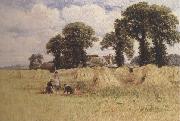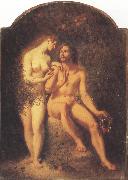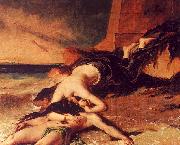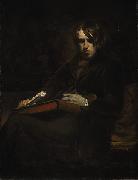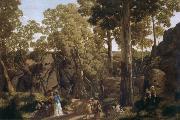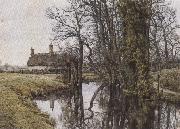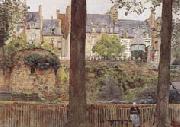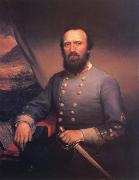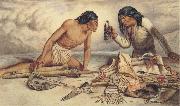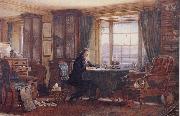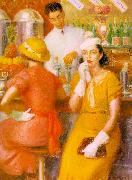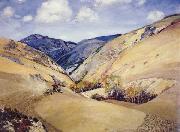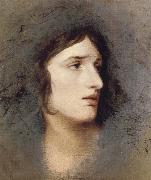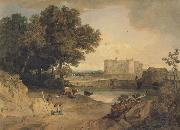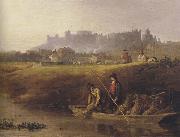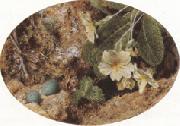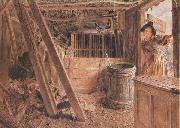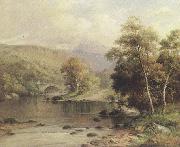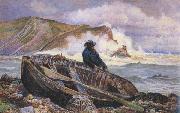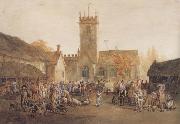|
|
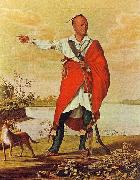 |
William Berczy
|
|
(December 10, 1744, Wallerstein near Noerdlingen, Germany - February 5, 1813, New York City, USA) was a German pioneer and painter.
Born in Swabia, Germany as a son of the Wirklicher Hofrat Albrecht Theodor Moll and Johanna Josepha Walpurga Moll nee Hefele, he was originally named Johann Albrecht Ulrich Moll, but later changed his name. He studied at the Akademie der bildenden Kenste in Vienna and at the University of Jena in Saxony. His early career was spent in several European countries, including Italy (meeting with Johann Wolfgang von Goethe in Florence) and England, where he exhibited at the Royal Academy. In 1792 he sailed for the Americas, setting up a business in York (now - since 1834 - Toronto) a couple of years later. He also worked in Quebec. Although best known for his portraits, he also carried out religious paintings and architectural work, including plans for Christ Church Cathedral in Montreal in 1803, and was a surveyor.
|
|
|
|
|
|
|
|
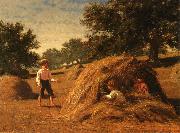 |
William Bliss Baker
|
|
(1859 - 1886-11-20) was an American artist born in New York City who was just beginning to hit his stride as a landscape painter in the Realism movement when he died at his father's house at Hoosick Falls, New York at the age of 27 due to a back injury received while ice skating several months earlier
Baker studied at the National Academy of Design for four years beginning in 1876,where he won first prize during his first exhibit in 1879. By 1881, Baker had set up a studio north of Albany, New York. |
|
|
|
|
|
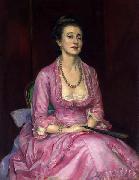 |
William Bruce Ellis Ranken
|
|
United Kingdom (1881- 1941 ) - Watercolours
painted Souvenir of the seventies. Signed with monogram and dated 1923 |
|
|
|
|
|
|
|
|
|
|
|
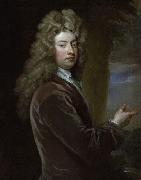 |
William Congreve
|
|
(24 January 1670 - 19 January 1729) was an English playwright and poet.
Congreve was born in Bardsey, West Yorkshire, England (near Leeds). His parents were William Congreve (1637-1708) and his wife, Mary; a sister was buried in London in 1672. He spent his childhood in Ireland, where his father, a Cavalier, had settled during the reign of Charles II. Congreve was educated at Trinity College in Dublin; there he met Jonathan Swift, who would be his friend for the remainder of his life. Upon graduation, he matriculated in the Middle Temple in London to study law, but felt himself pulled toward literature, drama, and the fashionable life. |
|
 |
William Cruikshank
|
|
William Cruikshank (December 25, 1848, Broughty Ferry, Scotland e May 19, 1922, Kansas City, Missouri) was a British painter and the grand-nephew of George Cruikshank. He studied art at the Royal Scottish Academy in Edinburgh, at the Royal Academy in London, and in Paris. His last studies were interrupted by the Franco-Prussian War. In 1871 he settled in Canada, opened a studio in Toronto and for twenty-five years was an instructor in the Central Ontario School of Art, later the Ontario College of Art. In 1894 he was elected a member of the Royal Canadian Academy of Arts and acquired a considerable reputation as a portrait and figure painter, and as a painter of Canadian scenes. Some of his paintings are in the National Gallery of Canada |
|
|
|
|
|
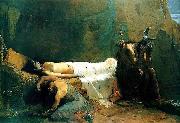 |
William de Leftwich Dodge
|
|
(1867-1935) was an American artist best known for his murals, which were commissioned for both public and private buildings.
Dodge was born at Liberty, Virginia in the Piedmont near Lynchburg. In 1879, his mother, Mary de Leftwich Dodge, an aspiring artist, moved her family to Europe. After living initially in Munich they moved to Paris, where she worked on art. Dodge later followed her example and became an artist. He spent most of his childhood years in France, where his mother was working on art. He studied at the École des Beaux Arts and took first place in the examinations in 1881. He also studied under Jean-Leon Gerôme and with Raphaël Collin at the Academie Colarossi,[1] and traveled to Munich for studies there.
|
|
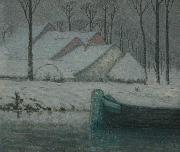 |
William Degouwe de Nuncques
|
|
(28 February 1867 - 1 March 1935) was a Belgian painter.
He was born at Montherme, the Ardennes, France, of an old aristocratic family, After the Franco-Prussian war (1870-71), his parents settled in Belgium, and he taught himself to paint. In 1894 he married fellow artist Juliette Massin, who introduced him to the circle of Symbolist poets, who had a considerable influence on his style. He belonged to the avant-garde group Les XX and later exhibited at La Libre Esthetique. He travelled widely and painted views of Italy, Austria and France, often of parks at night. His best-known pictures, Pink House (1892), The Angels (1894), and Peacocks (1896), demonstrate the magical quality of his work. Pink House is thought to have been a major influence on Surrealism, especially the paintings of Rene Magritte.
He is supposed to have said "To make a painting, all you need to do is to take some paints, draw some lines, and fill the rest up with feelings." A regular exhibitor in Paris, he was championed by Puvis de Chavannes and Maurice Denis.
From 1900 to 1902 he and his wife lived in the Balearic Islands, where he painted the rugged coastline and the orange groves. After suffering a religious crisis around 1910, he painted pictures that revealed his tormented state of mind, and during World War I, while a refugee in the Netherlands, he produced only minor works. In 1919 he was overwhelmed by the death of his wife and lost the use of one hand. In 1930 he married the woman who had helped him through the crisis. They settled in Stavelot, where he spent his last few years painting snow-covered landscapes.
The best collection of his paintings is in the Kröller-Meller Museum, Otterlo.
|
|
|
|
|
|
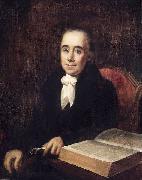 |
William Dunlap
|
|
(1 February 1766 - 28 September 1839) was a pioneer of the American theater. He was a producer, playwright, and actor, as well as a historian. He managed two of New York's earliest and most prominent theaters, the John Street Theatre (from 1796 - 98) and the Park Theatre (from 1798 - 1805). He was also an artist, despite losing an eye in childhood.
He was born in Perth Amboy New Jersey, the son of an army officer wounded at the Battle of Quebec in 1759. In 1783, he produced a portrait of George Washington, now owned by the United States Senate, and later studied art under Benjamin West in London. After returning to America in 1787, he worked exclusively in the theater for 18 years, resuming painting out of economic necessity in 1805. By 1817, he was a full-time painter.
In his lifetime he produced more than sixty plays, most of which were adaptations or translations from French or German works. A few were original: these were based on American themes and had American characters. However, he is best known for his encyclopedic three-volume History of the Rise and Progress of the Arts of Design in the United States, which was published in 1834, and which is now an invaluable source of information about artists, collecting, and artistic life generally in the colonial and federal periods.
|
|
|
|
|
|
|
|
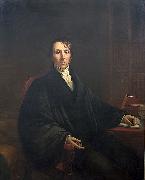 |
William Ellery Channing
|
|
(April 7, 1780 - October 2, 1842) was the foremost Unitarian preacher in the United States in the early nineteenth century and, along with Andrews Norton, one of Unitarianism's leading theologians. He was known for his articulate and impassioned sermons and public speeches, and as a prominent thinker in the liberal theology of the day. |
|
|
|
|
|
|
|
|
|
|
|
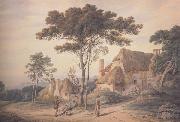 |
William Frederick Wells
|
|
A landscape painter in watercolor, Wells was the true founder of the Society of Painters in Watercolors in 1804 and its president in 1806-07. He studied under J. J. Barralet and exhibited at the Royal Academy from 1795 to 1804 and at the Watercolor Society to 1813, when he resigned.
|
|
|
|
|
|
|
|
|
|
|
|
|
|
|
|
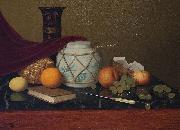 |
William Harnett
|
|
(August 10, 1848 - October 29, 1892) was an Irish-American painter known for his trompe l'oeil still lifes of ordinary objects.
Harnett was born in Clonakilty, County Cork, Ireland during the time of the potato famine. Shortly after his birth his family emigrated to America, settling in Philadelphia. Becoming a United States citizen in 1868, he made a living as a young man by engraving designs on table silver, while also taking night classes at the Pennsylvania Academy of the Fine Arts and later, in New York, at Cooper Union and at the National Academy of Design. His first known oil painting, a still life, dates from 1874.
|
|
|
|
|
|
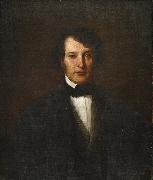 |
William Henry Furness
|
|
(1802-1896) was an American clergyman, theologian, reformer and abolitionist. Following the American Civil War, he raised funds for Black schools in the South, including Morehouse College.
A graduate of the Theological Department of Harvard University, Furness became the Minister of the First Unitarian Church of Philadelphia at the age of 22. A close friend of Ralph Waldo Emerson, Furness presided over a period marked by the growth and increasing prosperity for First Church. A fiery abolitionist, Furness was a supporter of the rights of all segments of society, including African-Americans and Jews. He also lived to see the construction of the current church building in 1885 in the role of Minister Emeritus.
Rev. Furness was the father of painter William Furness, Shakespearean scholar Horace Howard Furness, architect Frank Furness, and author and translator Annis Furness Lee.
|
|
|
|
|
|
|
|
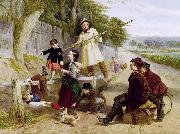 |
William Henry Knight
|
|
(26 September 1823 - 31 July 1863) was an English portrait and genre painter.
Knight was born in Newbury, Berkshire where his father, John Knight, was a schoolmaster. He was to become a solicitor, but gave up his law studies after two of his paintings were accepted by the annual exhibition of the Society of British Artists. He moved to London in 1855, taking lodgings in Kennington Road, Lambeth, and supporting himself by drawing crayon portraits while studying in the British Museum and in the schools of the Royal Academy.
|
|
|
|
|
|
|
|
|








